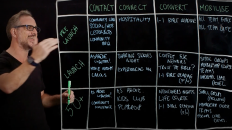A problem that I've noticed even very competent and organised people struggle with is capturing regular and long-term tasks. How do I remember to start work on that next committee meeting with enough time? How do I remember to bring those 'talking points' to every public speaking opportunity? How do I remember to think about this idea again in 18 months time?
This is a valuable skill for everyone, but especially for those in admin, support roles, project management and event management roles.
Here are 3 basic systems to improve in this area:
1. Plan out the 'hard landscape' of the year – and then plan when to start preparing for each thing:
- Maybe even get out a big wall planner? I've found that online calendar software is not an especially helpful way to visually do this work to begin with.
- What are the regular things that happen throughout the year? Meetings? Events? Recurring projects?
- What are the once-off things happening just this particular year?
- Add in when to start planning for this thing. Most things need at least a 6 week lead up. In my experience, smaller ministries often start things way too late – so probably add 2 months to whatever your first hunch is.
- Once you've done this for the first time, you can plug it into your calendar or task management software of choice and create a recurring task. I make these kinds of actions all-day actions so they appear along the top of the day.
- If you are using a paper calendar, have a separate sheet, that you can print out and put in each year's calendar with those things that need to happen weekly, monthly, bimonthly, quarterly etc
2. Regularly review and report
- Set aside regular time to review and report on all your projects and events and responsibilities. This will help you catch these recurring, occasional and upcoming things.
- You may set aside regular time in your work week/month to work on your various projects/areas of responsibility. Make sure you don't just use this time for the busy work of doing what comes up – use some of this time to do the larger review of the whole.
- Regularly report – weekly to your boss and semi-regularly to any larger boards/committees over you. But don't see these reports as a necessary evil. Use them as an opportunity to prompt you to do this kind of review of everything coming up in the next month or year – a spring clean. A report is really only useful to the degree that it is comprehensive.
3. Plug in new long-term tasks and recurring items
- Once you are aware of these first two things, be on the lookout for new things that pop up that need to be put into the hard-landscape and need to be reviewed/reported on. Build the habit and discipline of plugging them in.
- For an idea like 'We should re-evaluate the venue for this conference in 2 years' you should plug it into your calendar to thing about in 18 months.
- This kind of work is a great way to give ideas a chance. If you a regularly reviewing these 'someday/maybe' sorts of tasks, even if you keep pushing back their date, it enables you to give them a chance.
- Some of them you might eventually decide 'I'm never going to do this' and get rid of it. Others you might, because they are fresh in your mind, you might see other ways to use them.
- Some recurring items don't belong to a particular project or event – for example 'talking points'. Therefore you need to make sure you list in your reports and review processes, not only all your events, projects and areas of responsiblity. You need to also have an item called 'Other recurring items'. If a particular topic becomes big enough, it might earn its own category as an Area of Responsibility.



